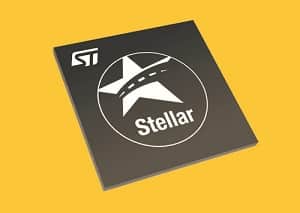These automotive MCUs can host multiple applications including virtualisation of safety and security with improved hardware functionality
 One of the toughest challenges faced by automotive manufacturers is that with the increased complexity of new car architectures, it becomes imperative to ensure reliable and deterministic execution of multiple independent real-time applications.
One of the toughest challenges faced by automotive manufacturers is that with the increased complexity of new car architectures, it becomes imperative to ensure reliable and deterministic execution of multiple independent real-time applications.
Now with the Stellar automotive microcontrollers (MCUs), independent applications can be consolidated into a single powerful Integration MCU, which typically involves choosing either determinism or virtualisation.
The Stellar Integration MCUs have been designed with exceptional computing power to significantly simplify the concurrent and deterministic execution of multiple-sourced software while guaranteeing the highest levels of safety and performance. These capabilities meet system requirements in the electrical/electronics (E/E) architecture of the next-generation connected cars.
The state-of-the-art processor includes hardware support for virtualisation, quality of service, firewall peripherals and for performing resource separation at interconnect levels. These features allow independent applications or Virtual ECUs to coexist in the same physical MCU by guaranteeing freedom from interference and secure compartmentalisation of software functions while supporting concurrent multiple ASIL safety levels.
Suits Challenging Real-Time Applications
Stellar embeds multiple Arm Cortex-R52 cores — some operating in lockstep and some in Split/Lock. It features a 2-level Memory Protection Unit and a low-latency Generic Interrupt Controller. The MCU is suited to hard real-time applications up to the highest safety integrity level, ASIL-D, specified in the automotive functional safety standard, ISO 26262. There are also multiple powerful accelerators for secure data routing, processing and mathematical functions, with advanced security support and extensive communication command and control.
Stellar Integration MCUs feature non-volatile Phase-Change Memory (PCM), offering fast read access times and single-bit alterability that is not available in Flash memory. PCM ensures Over-The-Air (OTA) updates with zero downtime, even for full-sized memory updates. In addition to increasing flexibility and erase/write cycles, single-bit alterability at runtime (no erase required) extends safety setup by refreshing bits to eliminate single-bit failures and extend the memory’s lifetime.
Integrated Management and Delivery
The Integration MCU offers comprehensive virtualisation at multiple levels using a Virtual Machine ID (VMID) at the network-on-chip and memory levels. Firewalls ensure complete separation at all interconnect levels including the peripherals. These firewalls allow Stellar to manage Virtual Machines (VMs) accesses and privileges to peripherals, ensuring the isolation of entire mission-critical functions.
At the same time, Stellar manages increasing software complexity and integration with better utilisation of its hardware resources. This reduces the total overhead of multiple separate ECUs performing their own housekeeping and managing communication-stack-related latency. In fact, Stellar can support several real-time operating systems (OSes) running independently, without interference. These OSes can separately manage applications with different functional-safety levels and superior processing capabilities for encrypted communication over Ethernet or CAN buses with dedicated AES accelerators to offload the main Hardware Security Modules (HSM) for MACSec, IPSec, and CAN authentication.
Coordinated Development
ST has developed this new technology with Bosch to meet future OEM integration demands.
“We have set up Stellar’s functionality to cover integration challenges while maintaining isolation and compartmentalisation,” said Axel Aue, Vice President, Bosch. “The computing performance for this kind of system is outstanding, with Phase Change Memory performance equal to, or surpassing, that of alternative Flash technologies. Moreover, Stellar’s performance concerning Firmware Updates Over-the-Air (FOTA) has been flawless with zero downtime and zero recovery time.”
“We designed Stellar to meet the demands of future Domain/Zone architectures and service-oriented communication needs, setting aggressive real-time performance, safety and determinism goals,” said Luca Rodeschini, Strategy & Automotive Processors and RF Division General Manager, STMicroelectronics. “The setup, evaluations and validations performed by Bosch now provide expert confirmation, showing that our teams’ integration of outstanding real-time performance, embedded PCM non-volatile memory and comprehensive virtualisation ensure efficient software isolation and compartmentalisation that will add to consumers’ safety and convenience in their vehicles.”
ST’s embedded-PCM technology has been developed and tested to operate within the most stringent automotive requirements for robust high-temperature operation, radiation hardening, cycling and data retention. ePCM achieves automotive requirements for AEC-Q100 Grade 0 with an operating temperature up to +165 degrees Celsius.
With more than 3000+ samples delivered, several more have been planned to be delivered in the coming days.




